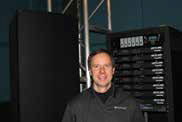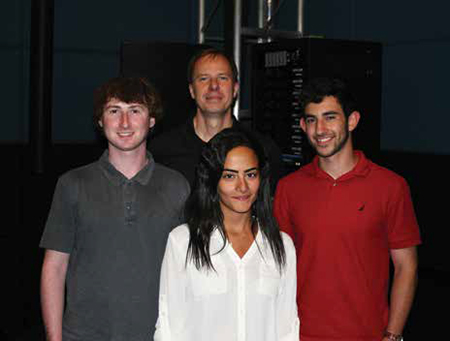Finding the Next Generation of Acoustic Engineers

A daily selection of features, industry news, and analysis for AV/IT professionals. Sign up below.
You are now subscribed
Your newsletter sign-up was successful
Quick Bio
Name: David Prince
Title: Director of Development Engineering
Company: Community Professional Loudspeakers
Sixteen years ago, after closing the doors at the 73-year-old loudspeaker firm Jensen for the last time, a colleague phoned from Northridge complaining “With Jensen closed, where am I going to find trained engineers?”
Not too long ago, the acoustic engineer species enjoyed a thriving habitat of companies around the globe. Our segment of the industry, which changes sound to mechanical motion to electrical signal and back again, was fruitful and multiplying. A fresh graduate skilled in math, physics, and engineering could join the brands he knew and loved from college speaker wars. The student could learn from seasoned veterans, building upon a solid engineering education he had in school, and with enough intelligence and the passion, nothing was impossible.
But today’s outsourcing, brand conglomeration, and competing “hot tech” fads threaten the acoustic engineering profession in all but a few concentrated geographical and market regions. The downside is that when you do need an acoustic loudspeaker engineer locally, there is a shortage of young talent.
We can overanalyze the underlying causes, but we can’t change the past. So how do we fix it? How do we prevent outright extinction? I propose that loudspeaker manufacturers and loudspeaker consulting firms seek out those young acoustic engineer cubs in school and nurture them to maturity where they can prosper. If you have the ability, you need to be a mentor and hire some young interns. While it may seem like a lot of effort, the return on investment is high, and the industry as a whole will benefit. Here are a few tips if you don’t know where to begin:
Liaise with universities near and far. Most educational institutions are elevating their career services game and are eager to work with potential employers. While universities known for acoustics are a great place to start, also look at your local talent. It’s more about the attitude of the student than the courses taken, and there’s a good chance neither of you knew the other one existed until career services made an introduction.
A daily selection of the top stories for AV integrators, resellers and consultants. Sign up below.
Act year round. Don’t wait until April or May to look for summer help, when the top talent is already committed to another industry. Keep an ongoing dialog with career services, so they can spot a good match early on.
Teach the teachers. Chances are that the local engineering professors don’t even know about your company. Let them work for you to find students who might be good candidates. Send them some information about your product or service, and invite them to see your facilities.
Network, unite, and socialize. We’re all in this together and know that it’s a small industry. If I know a candidate is a better fit for another company, I send them there…and they do the same for me. Let’s work together, in conjunction with groups like the AES, ALMA, and ASA to put together systems where employers and universities can work closely to learn about each other.

David Prince with a team of recent interns at Community Professional Loudspeakers. Left to right: Asher Jablon, David Prince, Jake Chervin; Carol Tadros is center front. Provide immediate and continued feedback. Don’t forget this could be the first “real” job the intern has taken. Correcting fundamental flaws right away can rescue a bad internship quickly. Be polite but don’t delay; no one wins by mismatched expectations.
Assign interesting projects. While it’s tempting to give all the grunt work to an intern, keep it in balance with some interesting, meaningful projects. Interns who can be proud of their contributions to a marketable product will be more motivated and likely to report positively on their experiences.
Teach them to listen to live music. The academic and early professional years are great opportunities to calibrate your ears to what acoustic instruments actually sound like in a room without an audio system in the way. This will benefit you both for a lifetime.
Protect their hearing. Surveys indicate that today’s generation believes there is some medical breakthrough that can fix their hearing in adult life. There is little basis for this belief. Teach them to wear hearing protection early and often, it may be their only chance.
Pay them well. OK, I have my gripes with this generation’s entitlement attitude, but interns are not slave labor. Competitive industries in software, media, and mobile devices have raised the bar. So while rock n’ roll passion is worth a few bucks, at least make it fair.
Take a chance. I’ll always be indebted to Rick Talaske, who took a chance and gave an internship to this green physics major who had little experience, but a strong passion for acoustics. If it doesn’t work out, you both part amicably with lessons learned.
In conclusion, while we’d like to hire experienced acoustic talent from a larger corporation the way we used to, today we need to step up and grow the next generation to keep the industry innovating. You’ve been given a rewarding career and an appreciation for good sound; now it’s time to pass it along to the next generation. Hire an intern; be a mentor. Provide the spark; create a flame. It’s fun, rewarding, and makes the world a better sounding place.
